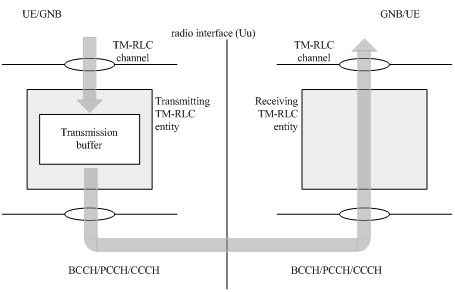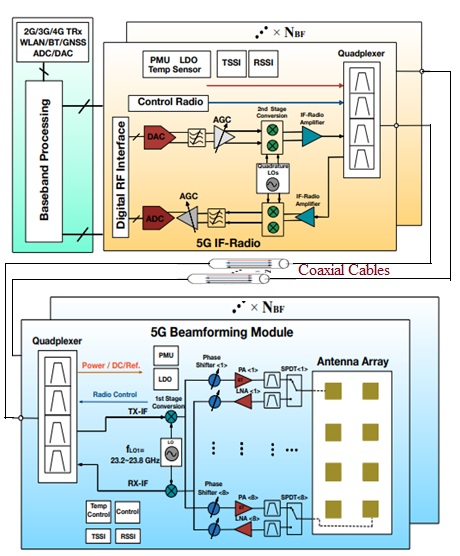5G Technology Features, bands, architecture, deployment, 5G Mobile phones
This 5G wireless technology section covers 5G features, 5G bands, 5G architecture, 5G deployment modes, 5G mobile phones manufacturers, 5G cell phone architecture etc. in the form of tutorials, terminologies and articles.
Introduction:
5G wireless technology is similar to other cellular wireless technologies such as 2G, 3G and 4G. It supports same as well as advanced features compare to backward wireless technologies. Refer 4G vs 5G >> for difference between 5G and other wireless technologies. It supports various frequency bands across the world including above 6 GHz (mmwave bands), below 6 GHz and below 1 GHz. Refer 5G NR Bands >> or 5G Frequency Bands >>. The 5G throughputs of about 20Gbps in the downlink and 10Gbps in uplink are benchmarked by most of the 5G network operators. Throughput speeds of about 5Gbps to 10 Gbps have been achieved during 5G field trials by them till now.
5G wireless technology is similar to other cellular wireless technologies such as 2G, 3G and 4G. It supports same as well as advanced features compare to backward wireless technologies. Refer 4G vs 5G >> for difference between 5G and other wireless technologies. It supports various frequency bands across the world including above 6 GHz (mmwave bands), below 6 GHz and below 1 GHz. Refer 5G NR Bands >> or 5G Frequency Bands >>. The 5G throughputs of about 20Gbps in the downlink and 10Gbps in uplink are benchmarked by most of the 5G network operators. Throughput speeds of about 5Gbps to 10 Gbps have been achieved during 5G field trials by them till now.
5G NR (New Radio) architecture

5G NR overall architecture is shown in the following figure-2. This is as defined in the 3GPP TS 38.300 specification. Refer 5G network architecture >>
5G Deployment Scenarios or modes

There are two modes underwhich 5G Cell phone operates viz. standalone and non-standalone. In non-standalone mode, 5G cell phone relies on backward technology such as LTE for control channel signaling and performs data handshake in 5G wireless mode. In standalone mode, 5G cell phone performs both control and data handshake itself without the need of any backward standards or technologies. Refer 5G Deployment Modes>> for more information.
5G NR Network Interfaces

Refer 5G NR network interfaces which include Xn interface, NG interface, E1 interface, F1 interface and F2 interface. Refer 5G NR interfaces >>.
5G NR Frame Structure


This page describes 5G NR Frame structure. It describes 5G frame as per NR (New Radio) 3GPP standard. The 5G NR frame structure depicts subframes,slot and symbol configurations. Refer 5G NR Frame Structure >>.
5G Channel Types

5G channel types cover logical channels and transport channels used in uplink and downlink with mapping between them. The 5G logical channels include xBCCH, xCCCH, xDCCH, xDTCH etc. The 5G transport channels include xBCH, xDL-SCH, xRACH, xUL-SCH etc. Refer 5G Channel Types >>.
5G Protocol Stack

The 5G layer-1 is PHYSICAL Layer. The 5G layer-2 include MAC, RLC and PDCP.The 5G layer-3 is RRC layer as shown in 5G protocol stack. Refer 5G protocol layer functions >>.
5G NR Physical layer processing for PDSCH and PUSCH

This article describes 5G NR physical layer. The physical layer processing for 5G NR PDSCH channel and 5G NR PUSCH channel have been covered stepwise. This 5G physical layer description is as per 3GPP physical layer specifications. Refer 5G NR PHY >>.
5G NR MAC Layer Overview

This page describes overview of 5G NR MAC layer. It covers 5G NR MAC functions, 5G NR MAC architecture, 5G NR MAC channel mapping, 5G NR MAC procedures and format of 5G NR MAC header and subheaders. Refer 5G NR MAC Layer >>.
5G NR RLC Layer Overview

This page describes overview of 5G NR RLC layer including functions. It covers 5G NR RLC modes (TM mode,UM mode, AM mode),data structures (TMD, UMD, AMD),RLC PDUs (TMD PDU, UMD PDU, AMD PDU), data transfers (TM, UM and AM) and RRC parameters which defines RLC layer. Refer 5G NR RLC Layer >>.
5G NR PDCP Layer Overview

This page describes overview of 5G NR PDCP layer including functions. It covers PDCP architecture (structure, entities), PDCP procedures for data transfer during transmit/receive operation, Data PDU and Control PDU formats of PDCP layer etc. Refer 5G NR PDCP Layer >>.
5G NR Initial Access Procedure

5G NR Beam Management Operations

5G NR Uplink Power Control
In wireless systems it is often required to either increase or decrease the transmit power of UE or mobile device. This is known as uplink power control.
Refer 5G NR Power Control Procedure >>.
Refer 5G NR Power Control Procedure >>.
5G NR Uplink Timing Control
In wireless cellular systems it is required to adjust timing of the uplink frame in order to have alignment with downlink frame in time scale. As we know uplink frame is transmitted by UE towards gNB where as downlink frame is transmitted by gNB towards UE. gNB is the 5G NR base station. The timing control procedure is initiated by MAC layer and conveyed to the PHY layer for time adjustment.
Refer 5G NR Timing Control Procedure >>.
Refer 5G NR Timing Control Procedure >>.
5G Cell phone architecture | 5G Mobile Phones Manufacturers

Refer 5G cell phone architecture >> article which describes block diagram of 5G cell phone including its basic components and their respective features.
No comments:
Post a Comment